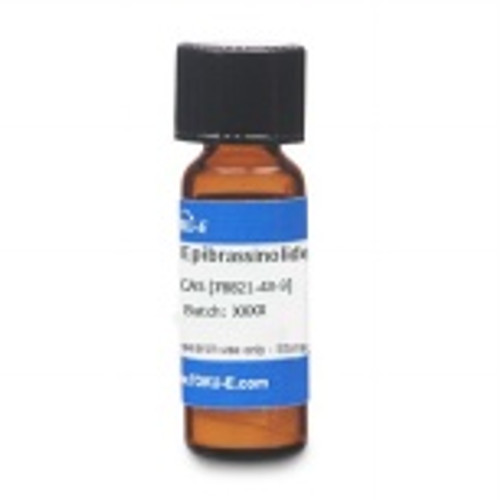24-Epibrassinolide (Epibrassinolide) is a member of the brassinosteroid family, a steroid-derived plant growth regulator involved in metabolic manipulation and protection from environmental stress. It is a natural polyhydroxysteroid with structural similarity to the steroid hormones found in vertebrates. Epibrassinolides can promote cell division and expansion. Epibrassinolide was found to interfere with polyamine biosynthetic and catabolic pathways, causing a reduction in polyamine levels and inducing apoptosis in various cancer cells.
24-Epibrassinolide is soluble in organic solvents but is sparingly soluble in aqueous buffers.
| Mechanism of Action | Epibrassinolide is able to offer protection from environmental stress by increasing metabolism or removal of toxic substances such as pesticides or heavy metals. Epibrassinolide can target polyamine metabolism which is having promise in human cancers. The compound can reduce intracellular polyamine levels which causes apoptotic cell death in tumor models. It can also influence stress-related molecules. |
| Plant Biology Applications | Epibrassinolide was applied to Brassica juncea L. under stress conditions due to exposure to copper metals and demonstrated its ability to reduce toxicity and restore healthy growth (Sharma, 2007).
Exogenous Epibrassinolide was applied to grape berry (Vitis vinifera) and was found to enhance ripening, the phenolic content, anthocyanin content, and antioxidant capacity in the grape skins, with 0.4 mg/L being optimal (Xi et al, 2013). Heavy metals and overuse of pesticides can impact food quality, and Epibrassinolide shows potential to alleviate heavy metals and pesticide stress in plants. It increases growth, biomass accumulation and photosynthetic efficiency. The compound scavenges reactive oxygen species, and induces proline protection that maintains osmotic potential and functions in osmo-protection (Shahzad et al, 2018). |
| Cancer Applications | Epibrassinolide was found to be a potential apoptotic inducer in cell death of prostate cancer cell lines (LNCaP (AR+) and DU145(AR-). It did not affect normal prostate epithelial cell lines (PNT1a). Its mode of action involved polyamines which play a role in abnormal cell proliferation. The compound was found to reduce intracellular polyamine levels which led to apoptotic cell death (Obaken et al, 2014).
Epibrassinolide was found to reduced cell viability and colony formation in colon carcinoma cell lines (HCT 116 and HT-29), influencing stress-related and survival signaling molecules (Coskun et al, 2015). Epibrassinolide induced apoptosis in colon cancer cells through activating endoplasmic reticulum stress moderated by calreticulin, a fine tuning chaperone molecule that plays a role in protein folding, as demonstrated in HCT 116, HT29, DLD‐1, and SW480 colon cancer cells (Ref). Epibrassinolide did not affect non-malignant cells (Obakan-Yerlikaya et al, 2017). |
| Solubility | Soluble in organic solvents. Sparingly soluble in aqueous buffers. |
| References |
Coskun D, Obakan P, Arisan E, Coker-Gurkan A and Palavan-Unsal N (2015) Epibrassinolide alters P13K/MAPK signaling axis via activating Foxo3a-induced mitochondria-mediated apoptosis in colon cancer cells. Exp. Cell Res. 338(1):10-21 Obakan P (2014) Activation of polyamine catabolic enzymes involved in diverse responses against Epibrassinolide-induced apoptosis in LNCaP and DU145 prostate cancer cell lines. Amino Acids. 46(3):553-564 PMID 23963538 Obakan P et al (2017) Calreticulin is a fine tuning molecule in Epibrassinolide-induced apoptosis through activating endoplasmic reticulum stress in colon cancer cells. Mol. Carcinog. 56(6):1603-1619 PMID 28112451 Shahzad B et al (2018) Role of 24-Epibrassinolide (EBL) in mediating heavy metal and pesticide induced oxidative stress in plants: A review. Ecotoxicol. Environ Saf. 147:935-944 PMID 29029379 Sharma P and Bhardwaj R (2007) Effects of 24-Epibrassinolide on growth and metal uptake in Brassica juncea L. under copper metal stress. Acta Physiol. Plant 29:259–263 Xi A et al (2013) Regulating the secondary metabolism in grape berry using exogenous 24-Epibrassinolide for enhanced phenolics content and antioxidant capacity. Food Chem. 141(3):3056-3065 PMID 23871059 |



